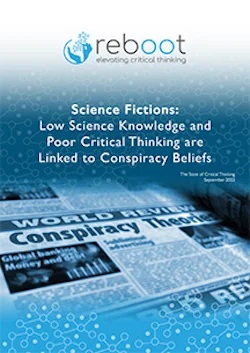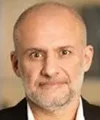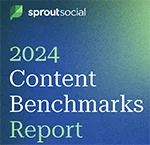The popularity of conspiracy theories and the rise of misinformation online has birthed an environment of deep political division and polarization. According to a recent survey by Paris-based critical thinking advocacy group The Reboot Foundation, these beliefs are correlated with a lack of critical thinking skills and basic scientific literacy, suggesting that education might be key to addressing this problem.
 |
On the face of it, Reboot’s survey revealed some troubling findings regarding how widely held conspiracy beliefs are among the American public. A quarter (25 percent) of the survey’s participants admitted they were open to believing at least one blatant conspiracy theory. An additional 25 percent said it was either certainly true or probably true that “COVID-19 is a biological weapon released intentionally by China.” 22 percent said it was certainly true or probably true that “the trails left in the sky by high-flying aircraft are actually toxic chemicals.” More than one in five (21 percent) believe that “5G mobile Internet is substantially harmful to human health,” and 15 percent said that “climate change was a conspiracy by the left to hurt the economy” was either certainly or probably true.
The survey also revealed that many Americans get failing grades for basic scientific literacy: 15 percent of respondents agreed with the statement that “the sun travels around the Earth.”
Most importantly, the survey’s findings suggest that improved education and media literacy efforts—particularly in schools—can have a mitigating effect on combating conspiratorial thinking. Those who claimed to get most of their information from higher education, government sources, newspapers or magazines were 26 percent less likely to believe in conspiracy theories than those who said they get most of their information from TV or social media. They also tended to achieve scores on Reboot’s science-literacy quiz that were, on average, about six percent higher.
Unfortunately, only 42 percent of respondents reported learning about analyzing science news in high school, and only 38 percent said they were taught about media messaging.
Conspiracy theorists also tend to lean politically conservative. Among the survey’s respondents, those who identified as conservatives were 65 percent more likely to believe in conspiracy theories than self-identified centrists and were 70 percent more likely to believe in conspiracy theories than respondents who described themselves as progressive.
The survey also uncovered conspiracy theories’ potential role in fueling political division in the country. Only 28 percent of respondents said they engage with people who hold opposing views. For comparison, that number stood at 37 percent in a similar Reboot survey conducted in 2018. An additional 30 percent in this year’s survey also said they rarely or never “seek out people who tend to have different opinions than me to engage in discussion or debate.”
Incredibly, an overwhelming majority (93 percent) said they believe that critical thinking skills are important in today’s world, and 84 percent said they support mandatory media-literacy education in schools. However, less than a third (29 percent) of respondents admitted that they think modern technology inhibits critical thinking,
Reboot’s report, “Science Fictions: Low Science Knowledge and Poor Critical Thinking are Linked to Conspiracy Beliefs,” surveyed approx. 550 U.S. residents between May and June. The survey was conducted using Amazon’s crowd‐sourcing service Mechanical Turk.


 What if companies could harness the fury of online outrage into a force for good? This is precisely where companies can start turning the trolls into brand champions.
What if companies could harness the fury of online outrage into a force for good? This is precisely where companies can start turning the trolls into brand champions. Audiences interacted with brand content far more often on Facebook and Instagram in 2023 than they did via X (formerly Twitter), according to a report that tracked engagement trends across different social networks.
Audiences interacted with brand content far more often on Facebook and Instagram in 2023 than they did via X (formerly Twitter), according to a report that tracked engagement trends across different social networks. Can public relations help counteract the dissension fostered by the power of digital platforms to spread hate, fear and confusion?
Can public relations help counteract the dissension fostered by the power of digital platforms to spread hate, fear and confusion? The number of Americans who get their news from TikTok has quadrupled in the last three years, according to a recent Pew Research Center report.
The number of Americans who get their news from TikTok has quadrupled in the last three years, according to a recent Pew Research Center report.


 Have a comment? Send it to
Have a comment? Send it to 
Oct. 6, 2022, by Bill Huey, Strategic Communications
One of the most salient paragraphs came next to last:
"Incredibly, an overwhelming majority (93 percent) said they believe that critical thinking skills are important in today’s world, and 84 percent said they support mandatory media-literacy education in schools. However, less than a third (29 percent) of respondents admitted that they think modern technology inhibits critical thinking."
Since such a high percentage believe that critical thinking skills are important, it would be interesting to know what they believe constitutes critical thinking.
At this writing, people believe what they believe, and many are unshakable. Soon we will begin hearing that the current economic woes are the result of a stolen election in 2020. Russian-generated propaganda, of course, but it will be believed.